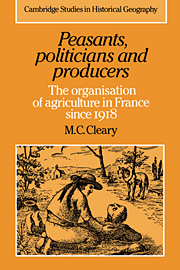Book contents
- Frontmatter
- Contents
- List of figures
- List of tables
- Preface
- Abbreviations
- Base map of the départements of France
- Introduction
- 1 The transformation of rural France
- 2 Individuals and associations in the farming community
- 3 Agricultural associations before 1914
- 4 The heyday of the regional unions, 1918–1930
- 5 The economic crisis and the rise of corporatism, 1930–1940
- 6 Agricultural associations under Vichy, 1940–1944
- 7 A rural revolution? Syndicates and cooperatives, 1944–1965
- 8 The deceptions of progress, 1965–1985
- 9 Representing the community – the place of salaried labour and women
- 10 Conclusion
- Notes
- Bibliography
- Index
8 - The deceptions of progress, 1965–1985
Published online by Cambridge University Press: 28 October 2009
- Frontmatter
- Contents
- List of figures
- List of tables
- Preface
- Abbreviations
- Base map of the départements of France
- Introduction
- 1 The transformation of rural France
- 2 Individuals and associations in the farming community
- 3 Agricultural associations before 1914
- 4 The heyday of the regional unions, 1918–1930
- 5 The economic crisis and the rise of corporatism, 1930–1940
- 6 Agricultural associations under Vichy, 1940–1944
- 7 A rural revolution? Syndicates and cooperatives, 1944–1965
- 8 The deceptions of progress, 1965–1985
- 9 Representing the community – the place of salaried labour and women
- 10 Conclusion
- Notes
- Bibliography
- Index
Summary
It was that newly found voice which, through the passage of the Orientation Laws in 1960 and 1962, and the rejuvenation of the syndical and cooperative movements, embarked on a programme of agricultural ‘modernisation’ which was central to the economic and social philosophy of the new revolutionaries. If the revolution itself was achieved in a spirit of united militancy, moulded by the church and brought to fruition through an alliance with gaullism, carrying through the aims of the new movement was a much more testing proposition.
The process of change set in train by the events of the early 1960s, based as it was on the creation of farms à deux unités de travail, created winners and losers and clearly exposed the different interests of farmers. Conflict between large and small farmers, between farmers of different regions, between the cooperative and private sectors of the burgeoning agro-industrial sector, and between the profession and the state continued to influence the programmes, membership and development of agricultural organisations.
The variety of such organisations can appear at times bewildering, with a labyrinth of private, official, economic and political groups involved in the process of agricultural policy-making and implementation. The chambers of agriculture have played an important role in coordinating agricultural programmes; at national level the Permanent assembly of departmental presidents (APCA) seeks to influence government agricultural policy. Negotiation between the syndical movement and government was, until reforms were attempted in the middle of the 1980s, channelled solely through the two ‘official’ syndicates – the Fédération nationale des syndicats d'exploitants agricoles (FNSEA) and the Centre nationale des jeunes agriculteurs (CNJA).
- Type
- Chapter
- Information
- Peasants, Politicians and ProducersThe Organisation of Agriculture in France since 1918, pp. 129 - 149Publisher: Cambridge University PressPrint publication year: 1989



